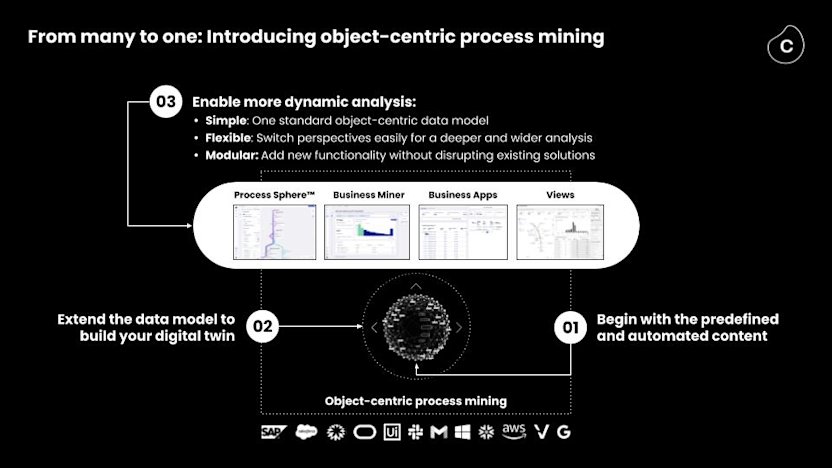
Celonis Object-Centric Data Model: Single source of truth for process intelligence
Object-centric process mining is a true revolution in process mining technology. Celonis fully embraced object-centric process mining with the release of Process Sphere™. Today, at the first stop on the Celonis World Tour 2023, which took place in Munich, Germany, the company followed up by announcing enhancements for Process Sphere and releasing a major, new OCPM innovation, called the Object-Centric Data Model.
“Object-centric process mining allows users to easily navigate through processes based on real-life objects and events, and fully unleashes the power of process mining,” said Alex Rinke, co-founder and co-CEO at Celonis, in a press release. “Customers can build and interact with their data more naturally, in a way they are already familiar with.”
Along with the Object-Centric Data Model and Process Sphere updates, Celonis announced two additional OCPM innovations, the Multi-Object Process Explorer and End-to-End Lead Times App. Celonis also showed a beta of LLM for PQL Generation, a forthcoming AI capability for Celonis EMS that translates natural language user queries into Process Query Language (PQL).
The Object-Centric Data Model is generally available now, the Process Sphere enhancements will enter general availability in the Fall.
Object-Centric Data Model
Object-centric process mining (OCPM) overcomes the limitations of traditional process mining techniques and allows organizations to better visualize and analyze the complexity and interconnectedness of modern business operations.
Process Sphere is a capability of Celonis EMS that uses OCPM to provide end-to-end visibility of business operations. Process Sphere allows businesses to visualize and analyze the relationships between objects and events across interconnected processes. For example, Process Sphere can show you if procurement problems are affecting sales order fulfillment.
The Process Sphere enhancements will enable customers to more easily explore multi-object processes and relationships and improve bottleneck detection. Analysts will also see recommended prompts and suggested use cases that they can use to structure their analysis, and will be able to better assess process conformance and deviations against process models.

The Object-Centric Data Model is an extensible data representation of an entire business. It acts as a single source of truth for all process intelligence and serves as the core of an organization’s digital twin. The model reduces the work needed to transform data from source systems (e.g., ERP, CRM, SCM, etc.) and operates side-by-side with existing Celonis EMS Event Log Data Models, making the transition for existing customers non-disruptive. Customers can continue using their current data models for existing processes, and take advantage of the new model for high-value use cases that require cross-process analysis.
The benefits of the Object-Centric Data Model include:
Greater modeling simplicity: Businesses can work with a data model that uses the same language they do–for invoices, orders, deliveries–rather than the language of their source systems, to better model the business. Additionally, the data model objects are reusable, meaning businesses no longer need to reinvent the data pipeline for each new project.
Faster, system-agnostic implementations: Companies can use Celonis’ apps and process content, no matter which vendor’s source system they use, leveraging standardized business definitions and prebuilt transformations for core processes.
More analytic flexibility: With traditional process mining, an organization must create a data model for each process it wants to analyze. With the OCDM, organizations can dynamically adjust process analyses, switching perspectives from process to process without needing to go back to the source data.
Multi-Object Process Explorer and End-to-End Lead times App
The Object-Centric Data Model enables object-centric process mining innovations across the Celonis platform. For example, it powers the new Multi-Object Process Explorer and End-to-End Lead Times App.
The Multi-Object Process Explorer is an enhanced version of the existing Celonis Process Explorer, which allows users to explore how process activities are connected. The new Multi-Object Process Explorer lets customers see how objects relate to each other and how an event relates to multiple objects involved in a process, something not possible with traditional process mining. Customers can use the new tool for initial exploratory analysis and from there, create custom views that address complex multi-object relationships in the Celonis Studio.
The End-to-End Lead Times App provides supply chain transparency and enables customers to reveal and mitigate bottlenecks in the creation of finished goods from sourcing raw material to final delivery. With this information, the company said, supply leaders can act more accurately and quickly to “improve service levels and accelerate cash conversion through better working capital.”
Object-centric process mining: Powering new ways to work
According to R “Ray” Wang, CEO and Principal Analyst at Constellation Research, companies need to urgently improve their core business processes due to current macroeconomic conditions. In a statement to Celonis, Wang said features such as the Object-Centric Data Model allow companies to “rapidly improve processes to achieve cost savings, increase customer satisfaction, meet regulatory requirements and boost overall performance.”
This sentiment was echoed by Alexander Sjamaar, Manager Finance with Netherlands Food and Consumer Product Safety Authority, a Celonis customer. During a World Tour 2023 session about OCPM, he said:
“I am excited about object-centric process mining. The new data model and Process Sphere™ will make it much easier for us to find the bottlenecks in our processes and help us find deeper business insights more quickly, without needing to do significant data preparations for each new analysis.”



